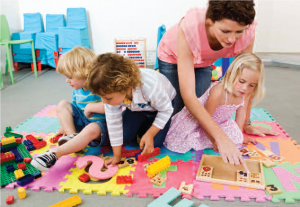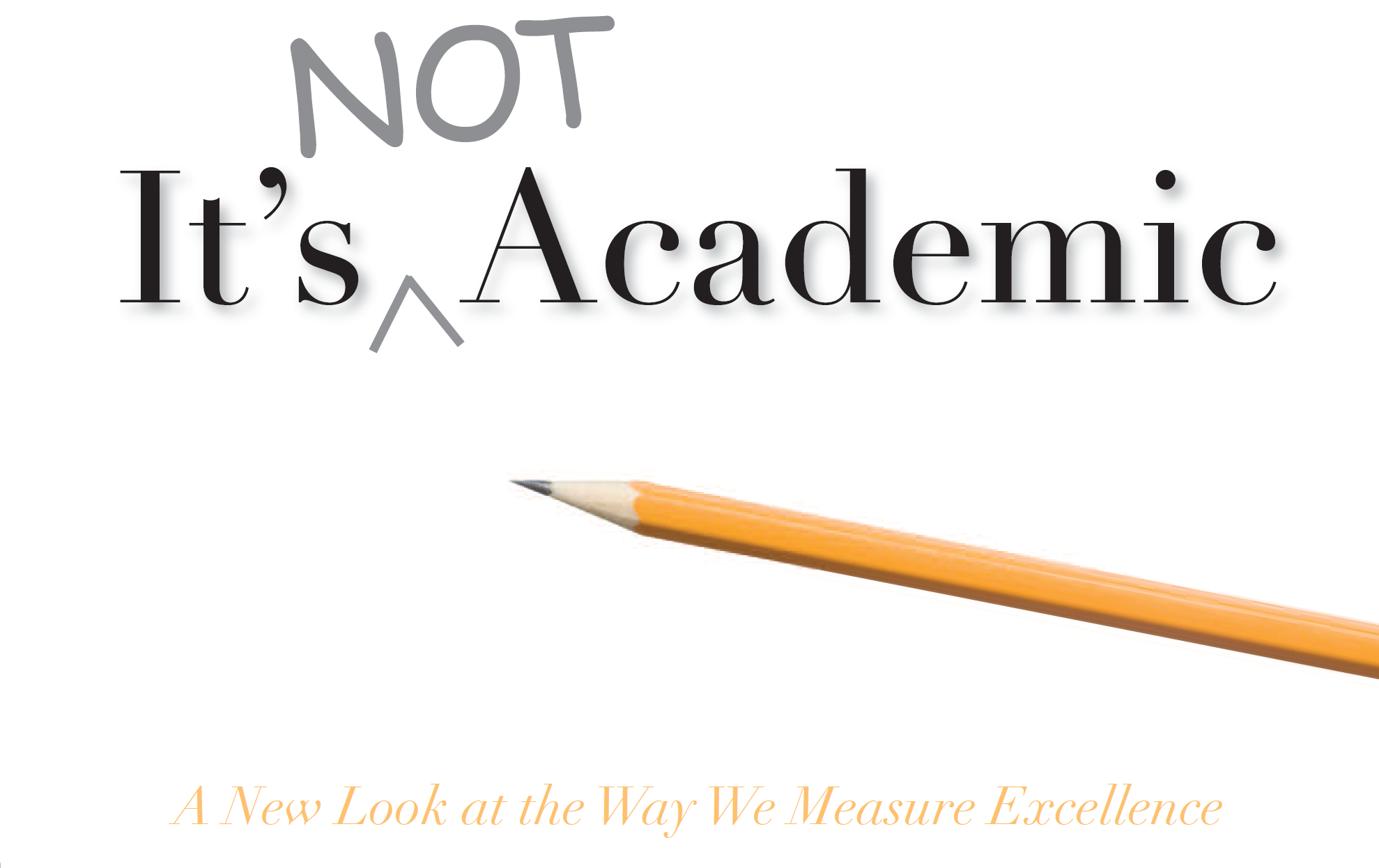A New Look at the Way We Measure Excellence

Photo credit: iStockphoto/Thinkstock
Having recently been coerced into a rousing game of Milton Bradley’s iconic preschool board game, Chutes and Ladders, I was reminded that the players don’t simply go up the ladders and down the chutes aimlessly. Each movement up begins on a square with a picture of a virtuous deed—for example, mowing the lawn or saving a kitten from a perilously high tree limb. The resulting square at the top of the ladder is a picture of the reward for that good deed, such as earning an ice cream sundae or money for a trip to the movies or the circus.
Conversely, reckless behavior—like eating all of the cookies or sneaking a comic book inside one’s history textbook—results in a quick trip down a chute as the deserved consequence of said choice. This popular pastime is perhaps one of the earliest values-based educational games a child might encounter. The message is unequivocal and morally relevant. But is this type of learning experience being woven into the curricula in our schools, where boys and girls spend the majority of their waking hours? Non-cognitive learning and concrete character development are crucial to the development of capable students and solid future citizens.
These qualities are particularly valuable when a young person enters the job market. The question is, how can skills such as resiliency, teamwork, creativity and respect actually be worked into traditional school curricula? These were among the “values” identified and selected in recent conversations among the heads of school of 25 institutions as part of an educational round-table. Other qualities included integrity, grit, empathy and zest—that enthusiasm that keeps us dedicated to the pursuit of knowledge. Among the participants was Dr. Chad Small, Headmaster of the Rumson Country Day School in Monmouth County. In his view, these qualities need to be viewed by educators in the same critical context as, say, math and science. “What is crucial to us staying ahead as a country?” he asks. “What precisely is it that makes America great?” This is far from a rhetorical question. Indeed, it is common knowledge that American students have fallen behind other countries in their educational aspirations. This has triggered legislation such as No Child Left Behind.
The crux is that, to support and fund such initiatives, politicians are demanding “measurables,” which in turn lead to test performance-driven teaching. This heresy of emphasis on test scores may well be costing our children dearly, as teachers de-emphasize acquiring values as its own skill set—even though such values are vital to success in career and life, according to recent research. How do we help students in independent schools— and in all schools—to better meet the future head-on? Resilience, maintains Small, is one of the core character traits American schools should be striving to cultivate in their students. Dr. Randy Kleinman, Montclair Kimberley Academy’s Head of Middle School, adds that selfmonitoring, consistent effort and self-advocacy are a part of MKA’s educational mission. “While we do not specifically identify a ‘non-cognitive’ segment of our curriculum, the emphasis on development of those skills is woven into our teaching and the students’ learning experiences throughout our program.” Kleinman says that his faculty has studied the work of Stanford psychologist Carol Dweck, who emphasizes the importance of “self-insight” and consistent, persistent effort as keys to success.
Dweck is among the many educators, ethicists and  academics pondering why attributes such as resilience have dwindled in recent decades. Dr. Richard Weissbourd, a Harvard professor, is also concerned about the priorities of parenting youth in America today. He calls upon parents to reflect upon the emphasis on their children’s happiness, self-esteem and achievement to the extent that these concerns appear to have usurped the importance of more character-driven values. Weissbourd goes on to say that American parents today are so concerned with their children’s achievement and happiness, that they shelter and hover—so much so that they attempt to envelop them in a stifling bubblewrap hug of insulation.
academics pondering why attributes such as resilience have dwindled in recent decades. Dr. Richard Weissbourd, a Harvard professor, is also concerned about the priorities of parenting youth in America today. He calls upon parents to reflect upon the emphasis on their children’s happiness, self-esteem and achievement to the extent that these concerns appear to have usurped the importance of more character-driven values. Weissbourd goes on to say that American parents today are so concerned with their children’s achievement and happiness, that they shelter and hover—so much so that they attempt to envelop them in a stifling bubblewrap hug of insulation.
Sparing kids adversity, he insists, actually divests them of coping skills. One might think that schools with religious affiliations would have some advantage in this respect, and perhaps they do. At Delbarton School in Morristown, implicit and explicit methods are used to teach skills like personal responsibility, resiliency, peer leadership, good decision-making, and effective communication. Brother Kevin M. Tidd, a member of the History and English departments who also heads up Delbarton’s Speech and Debate program, describes this focus as part of developing “a young man’s overall moral and religious character.” Union Catholic High School in Scotch Plains, has gone a step further and adopted the framework and holistic view developed by the Partnership for 21st Century Skills, a national non-profit organization that advocates the “4 Cs” for student education—Critical Thinking, Communication, Collaboration and Creativity.
Assistant Principal Christine McCoid points out that, although “21st Century” connotes proficiency in technology and media, non-cognitive values such as cooperative learning, resiliency and leadership are always incorporated at UC. “We measure the success of our core value integration through observation rather than absolute quantification,” she says, acknowledging that these skills are difficult to put a number on. Small agrees. Education, he says, has been soft in the area of quantifying character development: “We’ve always known we’ve done it, but we haven’t always known how to measure how well we are doing at it.” With regard to such assessment, Small and the 24 other heads of school at the aforementioned round-table prevailed upon the Educational Testing Service (ETS) to step in.
Using the core values identified by the group, ETS created a questionnaire to be distributed to students designed to encourage each child to self-report data regarding his or her character engagement while in school. The collected data will be anonymous, so that no individual student will be singled out. However, a seventh grade class at one school may be compared with another seventh grade class in an attempt to quantify, for example, values such as persistence and creativity. Imagine if high school seniors touted their “Empathy Scores” instead of swapping SATs. SATs matter for 12 months of your life. Empathy matters as long as you live. The Morristown-Beard School makes the concept of “student engagement” a central priority of its curriculum, and has actually attempted to quantify this non-cognitive quality. “We have tried to measure this aspect of life at MBS through administering the National Survey of Student Engagement for the past two years,” explains John Mascaro, Dean of Faculty. “The results of this survey indicate a high level of student engagement, and we feel that this engagement is a key factor in the ongoing success of our students.” Scoring non-cognitive skills may strike some as a little crazy at first. But in this world of scorekeepers, by measuring something, we deem it a metric that matters, that determines progress over time, that encourages goal-setting.
Private school headmasters can look at their Boards (who demand accountability for the “value-added” programs) and say, “This is what makes us better.” That is precisely why independent schools have picked up the gauntlet on this critical issue of character education and quantification. They do not take government money, which means these institutions have the freedom to push the envelope and explore progressive ideas like establishing baseline scores for non-cognitive skills. Why does that matter? Because if you can score something, you can also legislate and fund it. And maybe, if you can put character development on an equal footing with reading, writing and arithmetic, you’ve found the key to putting our kids back on top of the heap. “You have to start somewhere,” Chad Small says. “You’ve got to get the conversation going.”
Editor’s Note: Erin Avery runs Avery Educational Resources (averyeducation.com). She holds Master’s degrees from Oxford and Yale Universities.





